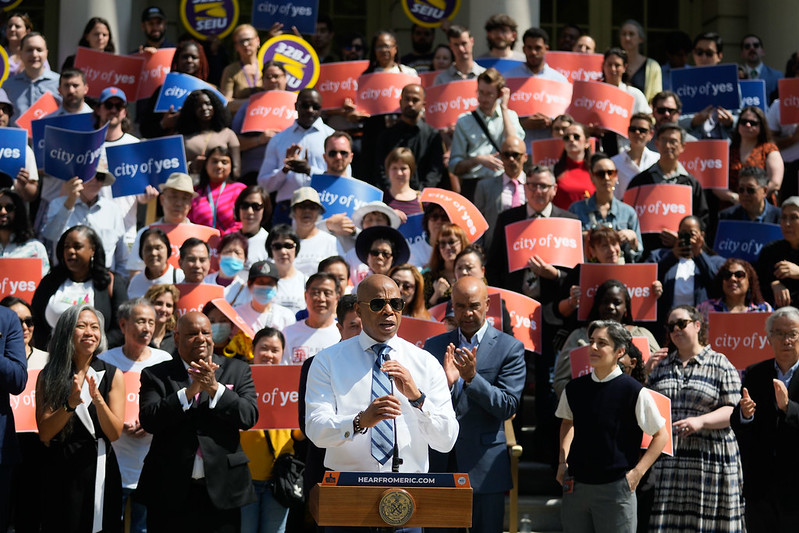New York isn’t just coming back from the pandemic, we are back, with the city setting a new record for jobs last month. But while employment is booming, our local retail still faces challenges. The City Council recently noted that the storefront vacancy rate currently sits at about 11.2% — close to pre-pandemic levels, and in most boroughs, trending down.
The vacant storefronts that dot our commercial corridors weaken the local economy, create unnecessary eyesores, and harm quality of life.
While there are many reasons why retail vacancy was rising pre-pandemic, there’s one reason that is entirely within our control: our 60-year-old zoning code. These outdated and out-of-touch rules can prevent small businesses from growing and/or opening near their customers. In some cases, zoning can make all the difference between whether a New Yorker opens a business and sees it thrive, or if they give up in the face of red tape.
One solution rests with the City of Yes for Economic Opportunity, a set of commonsense citywide zoning changes proposed by Mayor Adams, and currently being considered by the City Council. These changes look to update or remove many of the stifling rules that haven’t been revised since the signing of the Civil Rights Act.
Rather than continuing to hold back our mom-and-pop shops, this proposal would lift them up, helping to create vibrant commercial streets for residents and visitors alike. We are calling on the City Council to say no to retail vacancies by saying yes to a City of Yes for Economic Opportunity.
The proposal would loosen up gratuitous regulations to give businesses the flexibility to open, grow, and thrive. For example, take the case of a bicycle repair shop. In some places, you can run a store that sells bicycles — but you can’t repair those same bikes in that location. Or a dance studio can rent space on the second floor of a building, but not in an empty first floor storefront. That makes no sense. This proposal would drop many of those restrictions, creating more options to fill those vacancies.
New York City’s commercial corridors are restrained by outdated zoning stuck in the 1960s. When “manufacturing” meant dirty, noisy, and polluting factories, it was logical to keep those uses in industrial areas.
Today, there is a whole world of small-scale, clean production that’s getting caught in the same net. This includes local breweries, bakeries, ceramics, 3-D printing, and many more makers who don’t create any adverse effects on their neighbors. With the City of Yes, these small-scale clean producers would be allowed to open in our retail corridors and fill more vacant storefronts.
This is a win-win, providing entrepreneurs with an active customer base and giving nearby residents, workers, and visitors the option to buy local, homegrown amenities from a small business.
New York City’s vibrant nightlife and entertainment sector has evolved since the 1960s and so should zoning laws. Back in the 60s, no one was talking about escape rooms or virtual reality arcades, but those businesses are still regulated as part of a far-too-broad umbrella of “amusements” that stuck them in industrial areas, far away from their customers. City of Yes would allow these businesses in our commercial corridors, so you can visit an arcade or play ping-pong without having to trek across town.
Most egregiously, zoning includes rules that say if a storefront is empty in certain areas for two or more years, it can never be reactivated again. Overly restrictive rules like these do the opposite of what our own city’s regulations should be doing — and it is entirely within our power to fix it.
These changes will enhance quality of life for everyone in New York City, and add momentum to this administration’s historic efforts to finance new small businesses and cut red tape that have already contributed to dropping vacancy rates. With City of Yes, you’ll be able to leave your apartment, buy a loaf of bread, go to a dance class, meet some friends for mini golf, then grab drinks at a local brewery, all steps away from each other.
In sum, this is a win-win for entrepreneurs, commercial corridors, and our beloved city. A vote of YES for the City of Yes for Economic
Opportunity is a resounding vote of NO to storefront vacancies. We hope that the City Council will approve this necessary proposal and help make New York City an even better, more prosperous, and more vibrant place to live and work.
Garodnick is the director of the Department of City Planning. Kim is the commissioner of the Department of Small Business Services.
